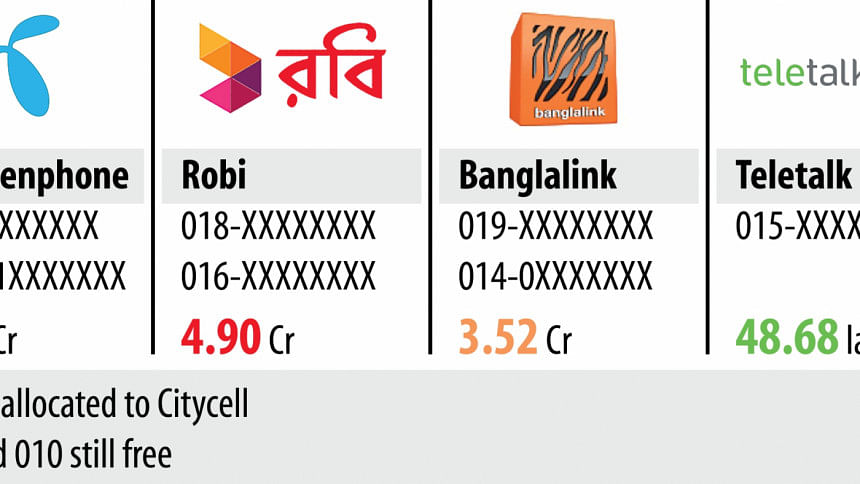Yet another bewildering decision from BTRC

The telecom regulator is being tight-fisted with the allocation of second mobile numbering scheme for the top three carriers, which are close to exhausting their original allotment -- a baffling stance given the government’s push towards digitisation.
Each numbering scheme is 10 crore slots, meaning the operator can issue as many connections with that numbering prefix.
The country’s leading mobile operator Grameenphone, which started out with the 017 prefix, have exhausted it and in October 2018 was allocated 0130 and 0131 number series, each with 1 crore slots.
Grameenphone is close to using up the recently assigned number series and the Bangladesh Telecommunication Regulatory Commission is refusing to give it any further number series.
However, as of December last year, its active customer number stands at 7.64 crore.
Also in October 2018, Banglalink was allocated a 0140 number series with 1 crore slots after it had run up its original 019 prefix. The BTRC has decided not to give it any new series.
The operator had sought two crore additional slots: it has so far used 39.20 lakh SIMs from the 0140 series and about 5.10 crore from 019.
Robi, which started out with 018 number series, was close to exhausting it, but in 2016 it got a number series when it merged with Airtel that had 016 number series with 10 crore slots.
Now, the BTRC has asked Robi not to sell any new SIM from the 016 code. Not just that, Robi cannot recycle numbers that were not used for months.
When Robi and Airtel merged, the regulator put a condition said that Robi can use the 016 prefix for two years and they will also have to migrate all their 016 numbers to 018 code in that time.
After two years, Robi informed the regulator that it is next to impossible to convert all the 016 numbers to 018: it will be of great inconvenience to existing Airtel subscribers, they said.
Subsequently, Robi has asked the regulator to let it use the 016 series.
The country’s second largest carrier sold 9.32 crore SIMs as of June last year and of that 4.76 crore were active at that time, according to the documents of BTRC.
Of the number, 2.92 crore were sold from 016 and 1.44 crore was active as of June last year, it added.
“We have nothing to do with the Robi issue as the merger conditions became a part of the court order and we cannot change it,” said Md Jahurul Haque, chairman of the regulatory body.
He acknowledged the technical challenge in migrating the Airtel numbers to Robi’s 018 prefix.
“But when the merger was settled by the High Court, that condition was accepted by both the parties. So, it is now part of the court order. We need to comply with that. Robi should have pointed out that problem at the time of merger.”
The telecom regulator also learnt that Robi frequently pushed to use the Airtel number as much possible and has intentionally create this problem, he added.
However, Robi said the 016 number code was part of the merger as Airtel got allocation of that code with its licence.
The Malaysian Axiata-owned operator also have invested Tk 5,400 crore to make the merger successful, which must also be considered by the authorities in the decision-making process, they said.
In its letter to the BTRC, Robi said as the regulator allocated two other carriers additional number codes, it needs to let Robi use two codes too. On that ground, the 016 series needs to continue.
For Grameenphone and Banglalink, the BTRC suspects that lots of numbers are still vacant on their existing number series, he said.
However, SM Farhad, secretary general of the Association of Mobile Telecom Operators of Bangladesh (AMTOB), said there is no benefit in keeping away the operators from offering new numbers to prospective customers.
Allowing carriers new series have enormous effects on the peoples’ communication and the digital Bangladesh aspiration.
“We should not forget that almost half of the people in Bangladesh are yet to be connected.”
As the government is pursuing 5G roll out, whose main attraction is IoT (internet of things), each subscriber will require multiple SIMs to avail the services, Farhad said.
The IoT is a system of interrelated computing devices, mechanical and digital machines, objects, animals or people that are provided with unique identifiers (UIDs) and the ability to transfer data over a network without requiring human-to-human or human-to-computer interaction.
“We are hopeful that the BTRC will understand the situation and allow the mobile operators as many numbers as required for the greater interest of the country’s communication endeavour,” Farhad added.

 For all latest news, follow The Daily Star's Google News channel.
For all latest news, follow The Daily Star's Google News channel. 



Comments